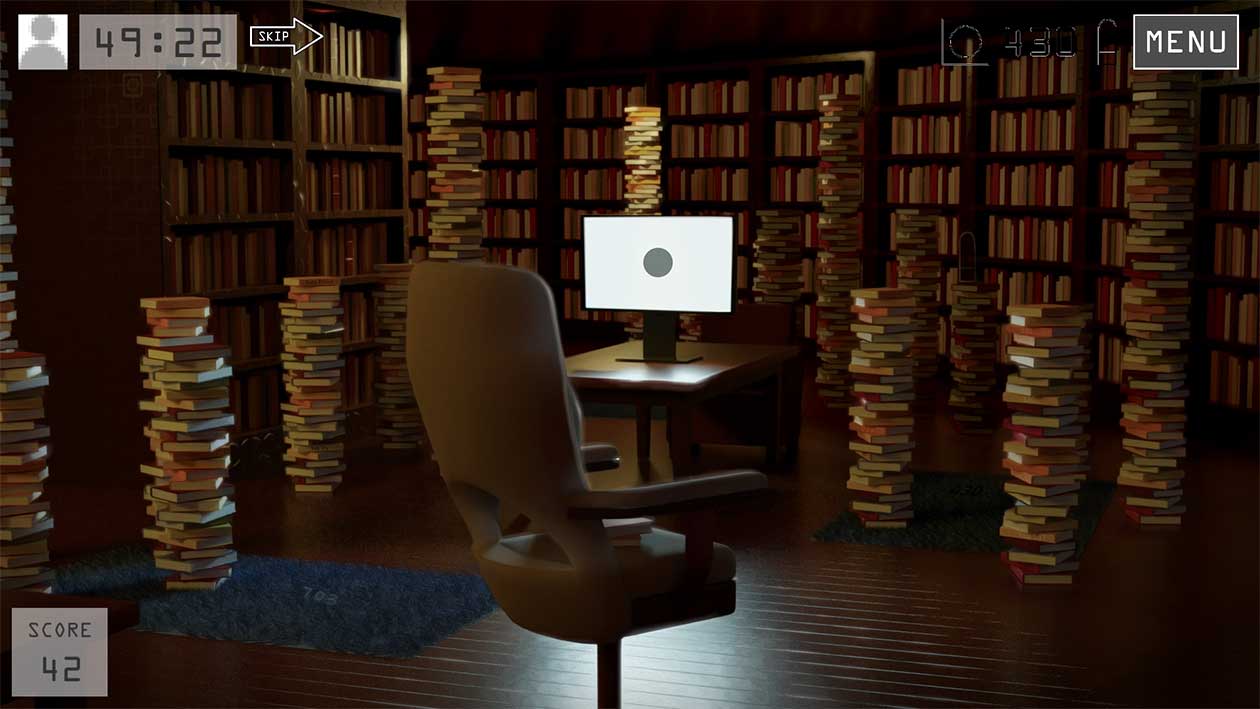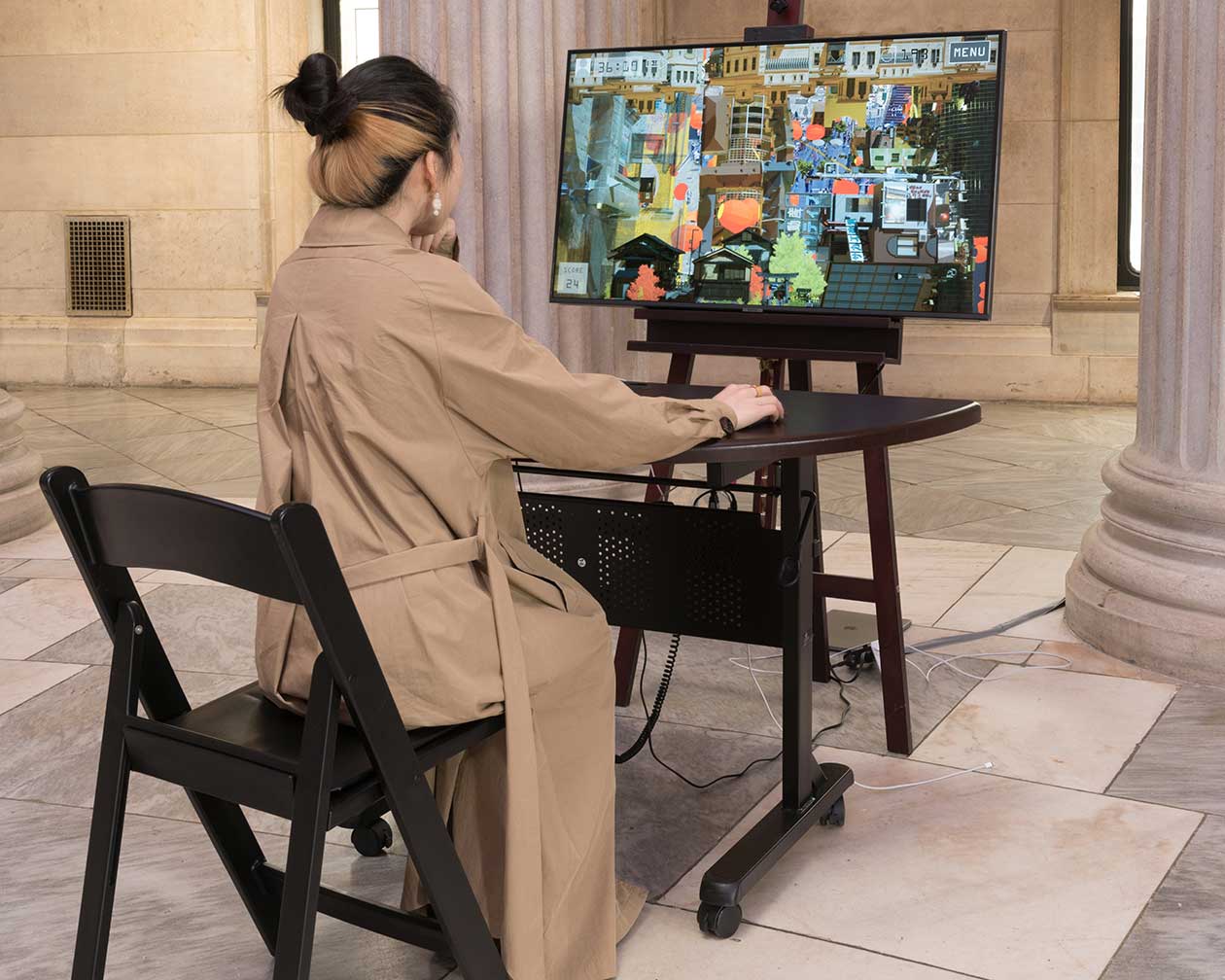Third Amendment
No Soldier shall, in time of peace be quartered in any house, without the consent of the Owner, nor in time of war, but in a manner to be prescribed by law.

Screenshot courtesy of the artist
Vi Trinh
Cyber Soldiers in Cyber Houses, 2022
Computer software with video, sound
Dimensions variable
Artist Commentary
Cyber Soldiers in Cyber Houses is a digital multimedia eye-spy game spanning thirty-two rooms with narration by two AI home assistants. In a future cyber 9/11-esque attack, the US government has increased cyber surveillance on all citizens. In this AI-assisted home, the player races against time to debug their house, finding the hidden items or bugs in each room before the game ends. Each room is attached to a Person of Interest who will be compromised if the player does not find the bugs. There is an option for the player to skip the room and move on to the next one. However, skipping a room comes at a risk. If the player has not found enough bugs to clear the room, the Person of Interest may be compromised and points will be added to the player’s score. When the timer runs out, the game automatically ends and the remaining points are tallied and added to the player’s score. The scores for all the players are displayed on an adjacent screen. The player should aim for a low score and must balance time management and risk to get the best possible outcome.
Cyber Soldiers in Cyber Houses explores the implications of the Third Amendment on digital privacy. Through AI dialogue, the game examines the application of our current laws and values on emerging technology as well as the problems inherent in technology, metadata, and mass surveillance that amplify current socioeconomic inequalities. Today, rather than soldiers, we have drones; instead of spies, we have malware. Cyber Soldiers in Cyber Houses examines the future relationship between the government and its people in the advent of stronger technology and our increased reliance on it.
The Third Amendment is the entryway to larger and more fundamental questions about privacy, the connection between the military and private companies, and the unprecedented power new technology gives the government and the hidden nature of that power. The game aims to arm the viewer with information in order to allow them to form their own conclusions about what they want policy to be. The mechanics of the game promote empathy toward others who might not have the time or resources to devote to their own privacy, even if the protection of others is inconvenient to the player. The game hopes to fight against technology designed for convenience that bypasses critical thinking. Technology in and of itself is an amoral tool, but sunk into a system of immorality it becomes an exponential factor in discrimination. It can, however, be reclaimed and repurposed for good.
How do we apply former structures, laws, and values on a rapidly expanding frontier of powerful technology? Data analysis on a grand scale has widened the scope of possible good and harm that large institutions can do. Big data and cyber surveillance are a constantly expanding frontier. There are still very few rules and restrictions to abide by, no one to answer to, and no checks on abuses of power. Currently we are expecting corporations and government institutions to hold their own leash. Cyber Soldiers in Cyber Houses shows how data and surveillance technology affects us in the past and in the present and asks what we are willing to allow in the future.
Special thanks to Athena Hosek for programming contributions that made the completion of this project possible.

Screenshot courtesy of the artist
Curator Commentary
In our call for submissions for this exhibition, we anticipated a lot of interest in the First and Second Amendments, and maybe some in the Fifth, possibly the Fourth. To our surprise, the Third Amendment proved to be among the most popular, doubling the number received for the Second Amendment. The underlying right described in the Third Amendment—protection from soldiers taking residence in a private home—feels distant, even quaint. Even if seldom referenced in court proceedings, the Third Amendment remains present in more colloquial contexts. While we have not had reason to literally house military representatives of the federal government in our homes, the broader implications of privacy from the federal government falls within popular understandings of the Third Amendment. More specifically, popular interpretations assume the Third Amendment affords privacy from government in domestic spaces. Inherent in this is the presumption that the federal government cannot trump local and state jurisdictions in a broad array of situations.
It is from this vantage that Vi Trinh speculates on the internet as a site for privacy from government intrusion. This is not a big leap. Indeed, much of what we recognize as the internet originated with ARPANET (US Advanced Research Projects Agency Network), a project launched in 1969 with funding by the US military. It was not until 1983 that the domain name system opened the ARPANET for applications beyond the military. A year later, the science fiction author William Gibson introduced the term cyberspace, creating a spatial understanding of the internet and establishing a model for comprehending the otherwise shapeless network.
In Cyber Soldiers in Cyber Houses, players solve hidden-object puzzles in which the player locates household infringements on cyber privacy contained within the images. True to the genre, each puzzle presents the player with a space—typically a room, filled with thematic furnishings, objects, and inhabitants. The player’s goal is to find all instances of a number, a microphone, and a camera in the space. Some instances of these objects are easily identified, others more obscured. Later in the game, the spaces shift to amorphous representations of cyberspace. Mechanically, the genre emphasizes pattern identification and visual acuity. Within Trinh’s work, the genre operates metaphorically: Can we see the potential for intrusion via the increasingly present “smart” appliances, alarm systems, digital personal assistants, and all manner of internet-enabled devices we bring into our homes?
As the player moves through Trinh’s puzzles, the traditional physicality of objects in the hidden-object puzzle become increasingly abstract within speculative imaginings of cyberspace. When the quartered soldiers are no longer physically present, how are our rights to domestic privacy preserved?
Vi Trinh works in digital and traditional media to examine the relationship between ecological and social patterns. A Vietnamese-American artist based in Washington, DC, Trinh graduated from the University of Richmond in 2019 with a B.A. in Visual and Media Arts Practice & Leadership. She is currently a MFA Fine Arts candidate at Goldsmiths University of London. Much of Trinh’s work is based in and on the Internet. Through her interactive digital art, Trinh explores dynamics of power and control, freedom and restraint, and how they manifest in networked media. Themes in Trinh’s work include aesthetics in ecological emergency; new temporal realities created by very large-scale phenomena; and the contradiction between the Internet as a seemingly free and democratic space, and the reality of the Internet as a site of exclusionary design, extractive corporatization, technologized colonialism, and the perpetuation of white supremacy.
1
Freedom of Religion, Speech, Press, Assembly, Petition
Congress shall make no law respecting an establishment of religion, or prohibiting the free exercise thereof; or abridging the freedom of speech, or of the press; or the right of the people peaceably to assemble, and to petition the Government for a redress of grievances.
2
The Right to Bear Arms
A well regulated Militia, being necessary to the security of a free State, the right of the people to keep and bear Arms, shall not be infringed.
3
The Housing of Soldiers
No Soldier shall, in time of peace be quartered in any house, without the consent of the Owner, nor in time of war, but in a manner to be prescribed by law.
4
Unreasonable Search and Seizure, Warrants, Probable Cause
The right of the people to be secure in their persons, houses, papers, and effects, against unreasonable searches and seizures, shall not be violated, and no Warrants shall issue, but upon probable cause, supported by Oath or affirmation, and particularly describing the place to be searched, and the persons or things to be seized.
5
Due Process, Self-Incrimination, Eminent Domain
No person shall be held to answer for a capital, or otherwise infamous crime, unless on a presentment or indictment of a Grand Jury, except in cases arising in the land or naval forces, or in the Militia, when in actual service in time of War or public danger; nor shall any person be subject for the same offence to be twice put in jeopardy of life or limb; nor shall be compelled in any criminal case to be a witness against himself, nor be deprived of life, liberty, or property, without due process of law; nor shall private property be taken for public use, without just compensation.
6
Rights of Defendents in Criminal Trial
In all criminal prosecutions, the accused shall enjoy the right to a speedy and public trial, by an impartial jury of the State and district wherein the crime shall have been committed, which district shall have been previously ascertained by law, and to be informed of the nature and cause of the accusation; to be confronted with the witnesses against him; to have compulsory process for obtaining witnesses in his favor, and to have the Assistance of Counsel for his defense.
7
Rights in Civil Cases
In suits at common law, where the value in controversy shall exceed twenty dollars, the right of trial by jury shall be preserved, and no fact tried by a jury, shall be otherwise re-examined in any court of the United States, than according to the rules of the common law.
8
Excessive Bails, Fines, or Punishment
Excessive bail shall not be required, nor excessive fines imposed, nor cruel and unusual punishments inflicted.
9
Additional Fundamental Rights of People
The enumeration in the Constitution, of certain rights, shall not be construed to deny or disparage others retained by the people.
10
Separation of Powers and Federalism
The powers not delegated to the United States by the Constitution, nor prohibited by it to the States, are reserved to the States respectively, or to the people.





